During the darkest days of our infertility journey, my prayers went like this: “How long O Lord? How long will you keep us childless?”
There’s not a lot of joy in this. Asking for the same thing over and over. Being stuck.
And as I was recently reading, Michelle Obama's new memoir, Becoming, she talks about this very pain in her own journey. Learning this about a very public figure is a good reminder that infertility is more common than we think.
So, no matter what we are waiting for, where do we find inspiration for our "stuck" times?
Simeon and Anna have become two of my waiting heroes in the Bible. Luke's account tells us that night and day both of these seniors devoted themselves to prayer and waiting for Jesus to arrive in the temple after his birth.
Simeon and Anna waited and waited. And they waited some more.
(If you want the full story, read Luke 2: 36-38).
Anna's entire purpose after her husband died was to be on this waiting journey—to be that prophetic voice that spoke the truth about baby Jesus who was yet to be born.
And then one day (gasp!) Jesus arrived at the temple with Mary and Joseph. Anna knew immediately! She spoke truth. Jesus was God’s Son. Her waiting was not in vain.
But, the longer I waited too, the more gifts the season of waiting gave.
I learned: who I am right now is ok.
I practiced: what I am doing right now is good (even if it not what I would have chosen).
For, no good waiting season is ever wasted time.
God is a mystery beyond all my understanding.
(And if you've met her, you can testify that this is true).
It's not because as many might think "I got what I always wanted."
Or I finally could feel at home in mom's circles.
Or because I could stop crying so much over my Christmas Eve sermons.
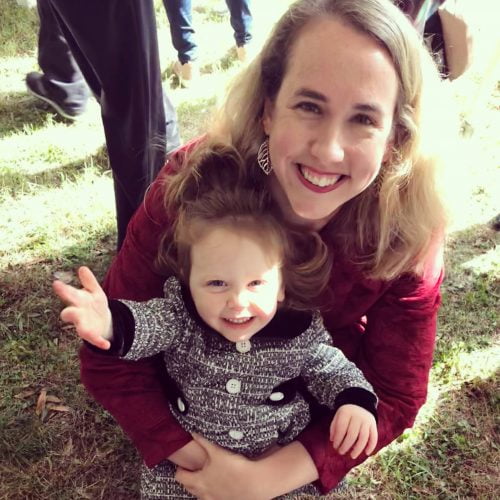 I rejoiced in motherhood as I bet Anna rejoiced over Jesus in the temple that day.
I rejoiced in motherhood as I bet Anna rejoiced over Jesus in the temple that day.
I am different kind of mother thanks to infertility. There's no small joy I take for granted. There's no milestone that I don't want to celebrate. There's no happy picture I can't wait to share with family and friends of the fun things we get into (sorry, friends, if I text you too often).
Adoption seemed too hard, too out of reach. Something we'd tried and had failed at too.
Well, until, it happened.
These days, I still look my daughter eyes with joy as she splashes in the bathtub, asks for more water before bedtime, or exclaims she wants to go to the playground yet again, and I thank God.
I thank God for the gift of growing up with her, learning from her and being HER mother.
My waiting season has brought me this joy.
I pray whatever it is that you're waiting on right now, you'll have the courage to keep waiting on joy too! Somehow, someway, it will come.
You won't be stuck forever.
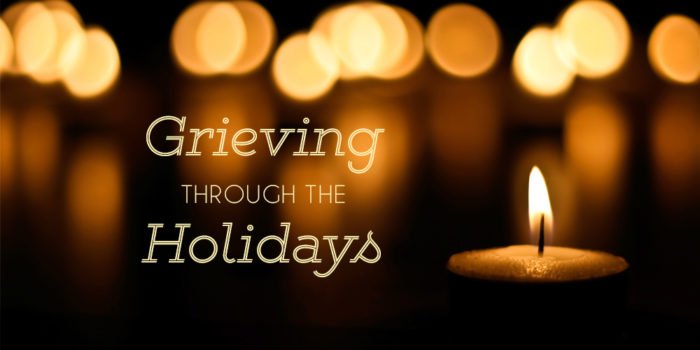
Someone around you is grieving right now. Even if you don't know his or her name. Even if you don't know why. Even if you'll never know why. So many people grieve on overdrive at this time of year.
Recently, I was teaching at "Attending to the Grief We Don't See" workshop at a congregation and I encouraged them to pay attention to certain times of the year trigger grief.
We all agreed that a season that tops that list are the calendar days from Thanksgiving to New Years. Such was my experience for years as my husband, Kevin and I waited with hope that we'd be parents one day. For a couple expecting but not yet expecting a baby or who have recently lost a baby, Advent can be a miserable time. (As everything in the culture screams children and babies!)
And for others of us, we're weighed down heavy by--
Hearing our cancer has returned.
A bout of depression which isn't getting better.
A child diagnosed with a learning disability.
An aging parent given months to live.
Enduring a job search with dead-end after dead-end.
Family dynamics that are just weird.
While songs of “peace on earth, goodwill to men” and “joy the world, the Lord has come!” are blasted on the radio, the grieving among us experience December more like Holy Week than Advent.
That first Christmas without mom here . . .
That second Christmas of being a divorced dad sharing custody of your kids . . .
That third Christmas that your son is in jail . . .
And on and on it goes.
Yet, because it is the holiday season many of us want to be happy, regardless. We want to be able to put whatever is bothering us aside and rejoice as the scripture exhorts us too. We want joy—even as much as our life circumstances aren’t naturally joyful.
So how can we be joyful? Is it even possible for the grieving?
I would love to offer that joy is a formula that can be followed (as many preachers offer: Jesus first, Others second, and Yourself last).
I would love to suggest that joy is an emotion of the will that we can just pray harder to make happen.
Or, I would love to tell you if you "Sing one more Christmas carol or bake one more sheet of cookies, then joy of the Christmas spirit will find you!"
But I can't.
Maybe you’re better at joy than I . . . but it has been my experience that seeking joy in the midst of waiting does not come through formulas and cookies.
Waiting on joy has looked more like:
Crying until I’ve run out of tears.
Sitting among the rocks and dirt in my backyard.
Drinking too much wine.
Pulling myself out of bed, brush my teeth and go to work without clean socks believing I'm doing the best I can.
And I've done these things on repeat. Then when I've been lucky, others have come to sit with me and done these things with me.
Here is what I most want to tell you: as I've allowed myself to feel what I feel and been honest with others about it, a miracle has happened.
My spirit has began to move just a little. It moved toward hope—that the next day would be brighter than the one before.
It moved toward love—that someone needed me to notice their pain so getting out of bed was, in fact, a really great idea.
And finally it moved toward joy—that though sorrow lasts for the night, in the morning joy comes.
Such is what I'm hoping for you this holiday season.
Your joy might not be bright and showy. You may not be the one in the choir singing the carols loudly.
But you'll be hanging on because of your quiet strength. And you will get through because you're braver than you know.
_____
Did you know I wrote a book for Advent? Check out Seeing a Different World here.
Want to hear more of my grief story? Check out my spiritual memoir about my long season of infertility. You can buy it here.
Would you like me to come speak with your congregation or community group about sitting with grief during tough times? Contact me.
Did you know that I wrote a devotional for Advent this year?
So thankful for the opportunity to be the writer for Chalice Press' (the same folks who published my book, Birthed) Partners in Prayer Advent devotion this year.
It was a lot of fun to start with a blank slate back in January and think about what kind of words we'd all need by the time that December rolled around.
I knew so many of us would be weary. I knew so many of would be longing for a new narrative in this crazy world we find ourselves living in. I knew that we'd be searching for fresh glasses to put on-- to see the world differently.
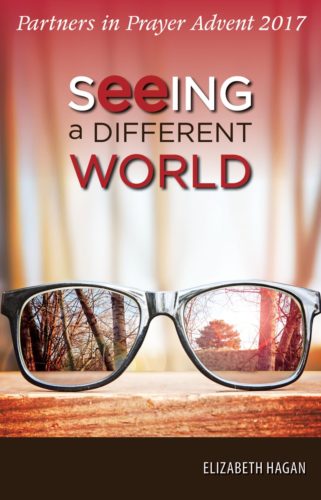 Thus, Seeing a Different World came to be, a devotion for this Advent season sticking close to prophetic texts in Isaiah, Jeremiah and Lamentations, all texts that cause us to stop and see the world as God sees it. It's an opportunity to re-see this December.
Thus, Seeing a Different World came to be, a devotion for this Advent season sticking close to prophetic texts in Isaiah, Jeremiah and Lamentations, all texts that cause us to stop and see the world as God sees it. It's an opportunity to re-see this December.
What's even better about this devotion is that a FREE candlelight service guide is available. You can download it here. It's a service plan for your congregations or for personal reflection time throughout the Advent season. I've heard that Sunday School classes are even using it for their discussions. And at my church, The Palisades Community Church in Washington, DC, we'll be hosting Vesper Services the first three Wednesdays in December following the candlelight service guide. So many possibilities abound.
To give you a preview of what you might find if you order this book here's an expert one devotion you can read in Seeing a Different World taken from Isaiah 32:1–5
The texts of Advent, this one included, remind us that all is not as it should be in this world.
Those appointed to rule over us don’t always lead with righteousness. The wrong people are exalted. We forget the sick, the imprisoned, and the lonely. The rich get richer.
But as much as Isaiah’s words tell us what is not right in the world, they also help us see differently. What is will not always be! Why? God wants US to be part of the change: to open eyes, to invite ears to listen to new conversations, and to open our mouths in ways that include others.
A friend of mine leads a nonprofit organization dedicated to ending homelessness. Her faith compels her to use her education, intellect, and God-given courage to speak for those caught in endless cycles of poverty. Many call the goal of her work unattainable. Yet she’s quick to fire back: If we don’t believe in and work toward the empowerment of all people, who will? Her advocacy shines a bright light into the new world that God wants to create.
It would be easy to write off hope in action as a pie-in-the-sky dream, saying, Well, that’s nice but it’s never going to happen. But as people of faith, God gave us this work!
You can read more by ordering your own copy on Amazon by clicking here.
Or you can order them over at Chalice Press. There's a special deal for bulk orders. (Buy 25 to 249, save 15%, Or buy at least 250, save 25%)
I can't wait to hear what you think as you read! Happy (almost) Advent.
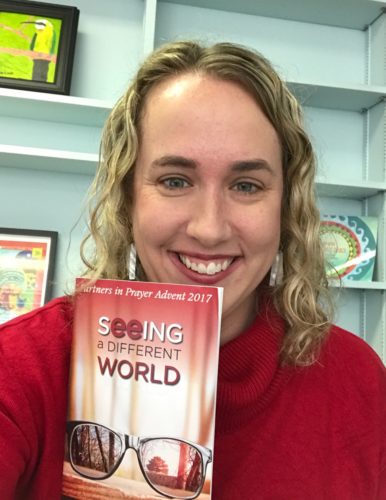
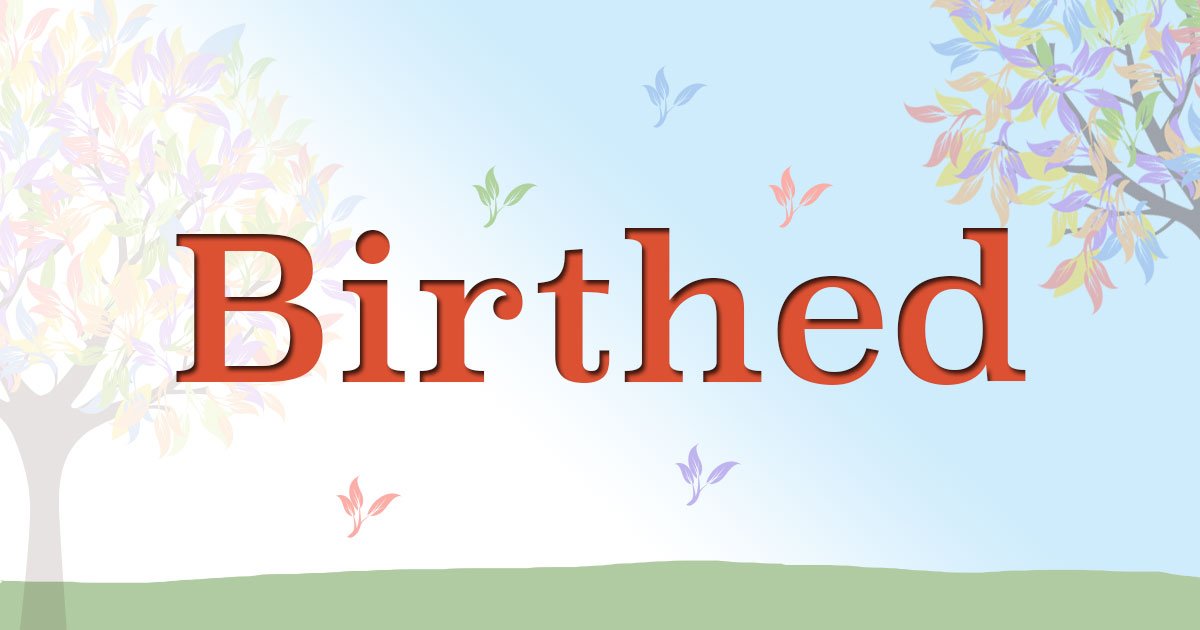
This Advent, I’m thrilled to offer you the voices of some articulate storytellers— writers with wisdom to share about how their experiences of pain or loss is birthing in them something beautiful. Not in a Pollyanna sort of way of course, but in the spirit of what Leonard Cohen once wrote: “There is a crack in everything. That’s how the light gets in.”
And isn’t Advent is all about light shinning in the darkness?
If you missed Meredith’s, Mary’s or Anne's story, check them out. Today, I’m glad to introduce to a friend, Susan, who knows a lot of about actual birthing for she's a midwife!
____________
I’ve had the privilege of witnessing love at it’s most primal, it’s most raw.
Midwives talk of a woman wandering off to “labor land,” where her neocortex is quiet and her animal body is in charge.
So often we relegate love to the realm of emotions and ideas: feelings, thoughts, a list of qualities we like or don’t like in a person.
But there is deep power in the non-verbal, embodied-ness of love: the way your lover smells, the comfort of his touch, your breathing synchronized in sleep.
It’s this embodied, animal love that we see in birth. Yes, there are thoughts of meeting baby, this new person swimming into the world. There are words of affection and mantras of courage, but mostly, it’s a body sort of love.
It’s an excruciating, exhilarating, wide-open labor of love.
The sounds and smells of labor are unique, earthy, grounded, and guttural. There is sweat, blood, vomit, humid warmth from the tub, and the scent of lavender wafts in the air. There is also timelessness: the sun rises and falls, we cover the clock, and the moments are marked by waves of intensity, surges of overwhelming body-love.
Transition, the final stretch of cervical dilatation before pushing, is one of the most powerful bits of labor.
It’s the moment when a woman, out loud or deep in her secret thoughts, will declare, once and for all, that she cannot, will not, do this any longer.
She will throw in the towel or die, because she has reached the brink of impossible and beyond, and it seems the magnitude of her own body’s power will crush her.
To this I whisper, “Yes, good, now you are close.”
While the laboring woman fears drowning in her own intensity, I see the final signpost preceding the finish line. This all-spent, everything-you’ve-got labor of love not only asks her for all she has, but also reveals her unbelievable capacity for courage, power, and strength.
She dives deep into reserves she never knew she had, and resurfaces as a mother, ready for the daily diving deep into self-sacrificial, redemptive, instinctual love.
I see that God, too, labors and births in and through this world, redeeming and re-creating it bit by bit, moment by moment, day by day.
This is not the kind of creating that snaps the finger, waves the wand, and “Voila!”
This is a slow and steady love, a one-foot-in-front-of-the-other, then back-to-the-starting-block sort of love.
The sun rising each morning, the flower opening each day, the child forgiving her sibling, the husband loving his wife, these are the moments of new life, birth and redemption in this world.
These are the wafts of lavender and the warmth of water soothing our groaning souls as we labor through the darkness and pain of this world.
God, the mother, moans through our failures, pushes toward our freedom, labors in love to birth us anew each day. If we open ourselves wide to this gift of aching love, we are invited in as co-creators with the creator of all.
We stretch, open, dive deep, and find our place in the excruciating and exhilarating labor of redemption.
Susan Smartt Cook lives in Edmond, Oklahoma with her husband Josh and her two beautiful pups, Ruth and Waylon. On any given day you will find Susan nurturing her small midwifery practice, her kitchen, and next year’s garden.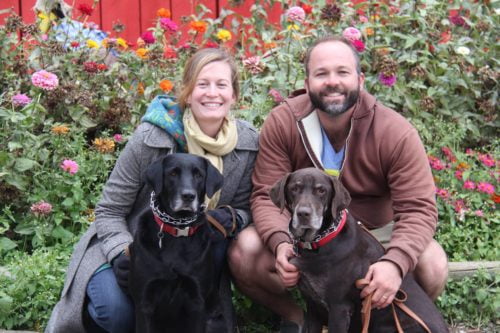

This Advent, I’m thrilled to offer you the voices of some articulate storytellers— writers with wisdom to share about how their experiences of pain or loss is birthing in them something beautiful. Not in a Pollyanna sort of way of course, but in the spirit of what Leonard Cohen once wrote: “There is a crack in everything. That’s how the light gets in.”
And isn’t Advent is all about light shinning in the darkness?
If you missed Meredith's or Mary's story, check them out. Today, I’m glad to introduce to my friend, Anne Bruce, a fellow Disciples of Christ pastor and a mom.
------------------------
Advent. The time of year I get to say: “This season snuck up on me this year!”
When we think about it, when are we ever ready? When are we ever ready to wait…. ready to plan…prepare…. do all the things our hectic culture demands of us and then somehow dig around in our ridiculous schedules to find some time to be with God?
It seems a little bit odd to find myself in this state right now, especially during Advent.
My second child, Michael, was born on October 6th. The night of his birth was long, painful, and exhausting.
When he finally came into the world, it was clear that although it was his due date, he still was not ready to be here.
I barely had a chance to look at his little, slimy face before he was rushed off to the nursery. Four hours later my husband and I learned that our pediatrician wanted him admitted to a special children’s hospital in Louisville. And so nine hours after giving birth I found myself in the passenger’s seat of my husband’s Jeep driving an hour and a half to see my baby boy and to hold him – wires, cords, oxygen and all – for the first time.
I consider myself incredibly lucky. His lack of response at birth did not herald an illness or complication. It was simply precautionary reasons that he was in the NICU. So what happened? I guess, to put it bluntly, it took him much longer to wake up than it should have. It took him longer to adjust to the cold air and blinding light of life outside the darkness of the womb.
But he was supposed to ready! It was time for him to come! Lord knows I was ready. And he should have come easily and quickly and painlessly because all second babies do, right?!
And me – I am supposed to adjust to this new life with a toddler and newborn easily, quickly, and painlessly.
And Advent – it comes every year and we should expect it and be ready for it and be filled with joy because it is a joyous season!
We know the culmination of our waiting comes in the beauty of Christmas Eve candlelight.
We know the promise of God in a tiny baby is coming again to save this messed up world. Easily, quickly, painlessly.
Except that it doesn’t work that way. It never does. Not for any of us.
I fool myself every year thinking that this Advent will be different. And I fooled myself before Michael was born thinking there would be no pointless tears this time around.
I ran across one of Mary Oliver’s poems the other day titled, “The Uses of Sorrow.”
Someone I loved once gave me
A box full of darkness.
It took me years to understand
That this, too, was a gift.
I have walked in the darkness of postpartum depression once already.
And I know that the grateful joy that lives in my heart will once again register in my brain. I didn’t expect to be in this place for a second time. But I feel its ugly head rearing as, one by one, another candle is lit on the Advent wreath.
So once again, much like my sweet boy, I find myself struggling to adjust to the cold air and the blinding light of life. Life outside the darkness of depression.
I’m just not ready yet to be the person I know I am; to live the beautiful life I have been given; to smile without faking it.
And yet, because I’ve been here before….and because there are so many beautiful people in my life who will hold me up….and because I trust in the promise of “God with us”…..I will wait through this season that I’m not ready for, and I will live to see the light shining brighter than before. I will be better, stronger, and more giving because of it. And hopefully, so 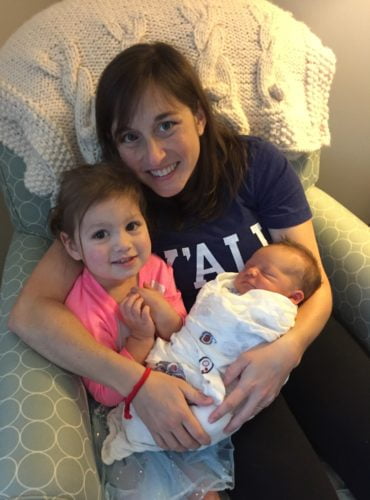 will my precious children.
will my precious children.
Because it takes years to understand that darkness is a gift.
--------
Anne is a co-pastor with her amazing husband, Jeff, at an awesome Disciples of Christ church in rural Kentucky. Not only do they live together and work together, Anne & Jeff also parent together with their 2 year old daughter, Abbey, and 2 month old son, Michael….along with two dogs, Patch & Pepper, and a cat, Skeeter.
Anne enjoys the relational side of ministry and has been exploring the spiritual practice of journaling and writing for a few years now. Writing about her experience with postpartum depression is something that is new and a little bit frightening for her…. especially because she loves her children more than she could have ever imagined possible, and the gratitude she has for her life and family is deeper than the sea.
 Here we are: Advent week #2. Lighting the candle of peace each day.
Here we are: Advent week #2. Lighting the candle of peace each day.
Though it's the time of year that we sing "Let there be peace on earth."
Though it's the time of the year when we hear Amy Grant singing about her wish for "No more lives torn apart. And wars would never start."
Though it's the time of year when we long for and idealize moments of family harmony with everyone being under the same roof.
I'm not sure this is exactly what Advent's peace is all about.
I've been preaching this Advent over at Springfield Christian Church in Springfield, Virginia and I have been struck by the Isaiah lectionary readings that . . .
Peace is often nothing like we expect.
Consider this: there are places we expect to see beautiful growing things, aren’t there? A greenhouse, a tropical vacation spot, Disney World.
But then there places we wouldn’t expect to find anything new or life-giving.
Such would be the tale of the house that Kevin and I lived in for 5 years before selling the property (thanks be to Jesus) over a year ago.
In a historic neighborhood, large oak trees filled every corner of the street. Sure, these trees were trees were lovely to gaze upon in the spring time, but when it came to this time of year, the trees rained leaves and leaves and leaves.
I’d be raking, blowing and blowing leaves some more often up until nights before the prediction of the first snow.
No matter how hard we worked to remove our yard of them, they never seemed to go away. We always seemed to keep some from fall to fall no matter if we wanted to our not.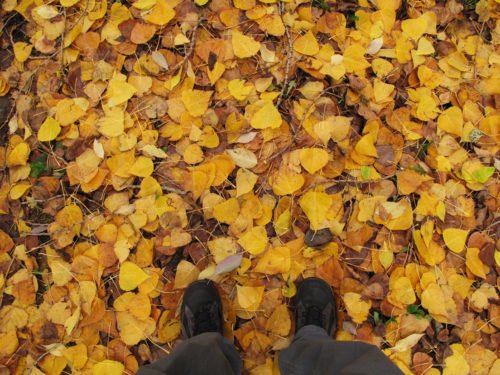
We’d ask for input from some great landscapers only to hear each one of them say, “Well, have fun growing moss.”
Of course, we could have cut some of the trees down to solve our problem, but the neighborhood had some rules about that and who had 10,000 of dollars lying around just for “tree removal?”
So . . . with our “throw our hands up in frustration” approach to our yard, I never tried growing anything even though I love flowers and the idea of fresh tomatoes.
I affectionately referred to our yard the Hagan wasteland.
However, I remember one March walking outside in the crisp of the morning in shock.
Before my eyes stood tulips breaking forth from the rocky ground.
I wanted to shout, “How in the world did my desolate yard grow something so beautiful?’
Because let’s review: we did not till the soil. We had not planted any seeds. We didn’t even remove all the leaves from the flower bed months before.
Yet these were gorgeous pink, white and yellow tulips. I couldn’t stop staring at their loveliness.
If you’ve ever had a surprise in your backyard or somewhere you’ve visited, then you’re in the perfect emotional spot to hear this word from Isaiah 11:1:
Isaiah offers this prophetic word, “A shoot shall come out of the stump of Jesse, and a branch shall grow out of its roots.”
It’s equally unthinkable vision of the future both for the time and place over which it was spoken and the image it presents.
Think about what a dramatic metaphor this is? A branch growing of a stump. There’s nothing more dead than a stump, isn’t there?
For we know, right that a stump the remains in the ground of a tree that has been cut down. It might have been great at one time but is no more. And it’s an unsightly part of any yard or forest patch, isn’t it? So much so that when we do have trees removed from our yards we often ask for the stump to be dug out as well. What good is a stump in the middle of a patch of earth?
Stumps tell stories of death—and who wants to be reminded of that?
I had a neighbor once who told me of her difficulties selling her house because the giant stump in the middle of the yard was perceived as an eye sore. So much so that her real estate agent came and made her plant a flower bed over the top of the stump. And it worked—days later with the disguise in place she finally got an offer.
Yet, Isaiah says this unthinkable word about a stump that has nothing to do with ignoring it or covering it up. “A shoot shall come out from the stump of Jesse, and a branch shall grow out of its roots.”
But here’s the heart of Isaiah’s message. Death was not the end of the story: “A branch shall grow out of [the stump’s] roots.”
 As I was sitting with this text last week, the image that came to mind for me was of a stump with a Charlie Brown like Christmas tree growing out of the top—small, fragile branches with a few leaves on each stem. Can you see it too? Shockingly brilliant in its existence.
As I was sitting with this text last week, the image that came to mind for me was of a stump with a Charlie Brown like Christmas tree growing out of the top—small, fragile branches with a few leaves on each stem. Can you see it too? Shockingly brilliant in its existence.
Contextually this image is helping us see that God had a plan to reconcile not only Israel, but all of humanity. A branch would soon be growing out of a dead stump. This plan would also be shockingly brilliant in its existence too.
And in a couple of weeks, we’ll all start talking about “For unto us a child is born and unto us a Son is given.”
We'll talk about a movement of God that was birthed in a sleepy little town, in disdained tiny stable and attended by some unknown shepherds.
We'll talk about some swaddling clothes.
But we’re not there yet—
I think in the waiting God wants to expand our imagination of what peace looks like.
Jim Wallis, founder of Sojourners tells the story about a trip he took to South Africa in 1987. Nelson Mandela was still in prison. Segregated everything was alive and well.
During his trip, he said, "I met a 14-year-old boy who was, like many, organizing in elementary and high schools [toward social change]. I asked him if he was optimistic for the future and he said, 'Yes.' [Then] I asked him if he thought there would be a new, free South Africa someday, and he stated to me matter-of-factly, 'I shall see to it personally.' ...There is simply no other alternative than for each person to see to it personally."
Though we all know in 1994 this boy’s vision became a reality, you can imagine how crazy he sounded in 1987? Reconciliation in South Africa in his lifetime? Release of Nelson Mandela? He had to be kidding, right?
And I believe, the vision of this South African boy is what Isaiah 11 is begging us to see—a world where peace actually happens.
One of my professors from seminary Dr. Portier-Young puts the message of the text like this, “This is the promise, the glorious, abundant resting place where the root of Jesse stands. This is the vision of security. The shoot will grow tall and become a visible sign for the nations. Not a battle standard, but a standard of peace.”
Or simply put- God’s reconciliation work looks as wonderful and as laughable as this. Peace looks like this. New life coming from what is really dead.
So do you have something dead in your life? Then open your heart up to expectation. This is where the peace is going to come.
Over the next 4 weeks of Advent, I'm thrilled to offer you the voices of some articulate storytellers--- storytellers with wisdom to share about how their experiences of pain or loss is birthing in them something beautiful. Not in a Pollyanna sort of way of course, but in the spirit of what Leonard Cohen once wrote: "There is a crack in everything. That's how the light gets in."
And isn't Advent is all about light shinning in the darkness?
Today, I'm glad to introduce to my friend, Meredith Holladay who I met this year while attending a writing workshop at Austin Presbyterian Seminary. Sometimes the best we can do is be exactly where we are now.
_________________
I’m still waiting to get my period. That is something I never thought I’d feel the need to say to strangers, on the internet, by way of introduction.
In October I miscarried, and now we wait until we can “try” again. (A phrase I’ve never entirely understood, but that’s neither here nor there.) And when it finally does come - and flow - and go - we get to wait again. This whole ordeal is such a series of waitings. There is very little either my husband or I can do to affect anything. Even the “trying” is just a shot in the dark (weak pun, weakly intended).
We were pretty surprised that the pregnancy happened as fast and as easy as it did. So surprised, that I took no fewer than 5 pregnancy tests. We both know too many people for whom the journey from trying to parenting was long, difficult, sad, that it just seemed too good to be true.
No one told me (why would they tell me?) that losing a baby - an embryo - would hurt so bad. In retrospect it seems so obvious. I had never felt more like an unwelcome guest in my own body. My own attempts to understand are defied at how we could want something so bad, and my own body turns in on itself. Of course the doctors say all the right things about chromosomal abnormalities and how “this would have happened anyway,” and all the medical stuff to offer comfort. But that did not change the fact that my body had rejected a life it had helped to create and I was the one curled up suffering pain in all the ways I could possibly feel it - physical, emotional, spiritual.
One of the worst parts was the distance I felt from my husband, whom I love more than anything, more than any idea of a child.
As much as he tried to understand and help, he could not be inside me in the ways that the grief seem wrapped up in the cramping and bleeding and hollowness. How could he understand the feeling of his own body rejecting life - rejecting something that is supposed to be good and right? It was, to say the least, hard.
My counselor suggested that we find some way to find closure about the loss. I didn’t know what that looked like. (I still don’t. It seems part of the waiting.)
My husband likes to be outside and likes to work on our yard. He likes to discover new plants, flowers, shrubs.
The idea came to me that we should find some kind of flower that would bloom about the time that baby would have - should have - been born, and something we could plant now. It seemed like a small way to say - here’s this life we lost - we’re putting it in the ground. We’ve turned that life over to the earth, and the seasons. It seems too poetic, but perfect, that the life we 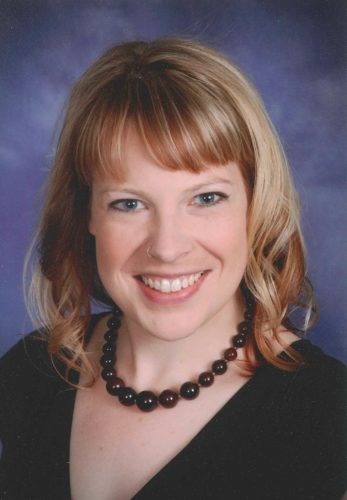 lost, and then planted, must first endure the frozen ground. And then the miracle of sun and rain and warmth will bring blooms into our yard.
lost, and then planted, must first endure the frozen ground. And then the miracle of sun and rain and warmth will bring blooms into our yard.
The flowers seem enough for now.
But we’re still waiting. I’m still waiting. Hoping, longing, that life that breathes and cries and poops and walks and talks will be birthed from this.
We don't know. Maybe closure will be a much longer wait- A Come, O Come Emmanuel kind of waiting.
Living in the middle is where we are. It's almost too poetic that we continue to wait as we have officially entered the Advent season. I'll try not to overthink that part.
But for now, we are just hoping my period comes back soon.
By day, Meredith teaches 7th grade English in Kansas City, Kansas; by night, she is dog-mom to the two cutest cockapoos around. You can find her reading and laughing alongside her husband, Zach.
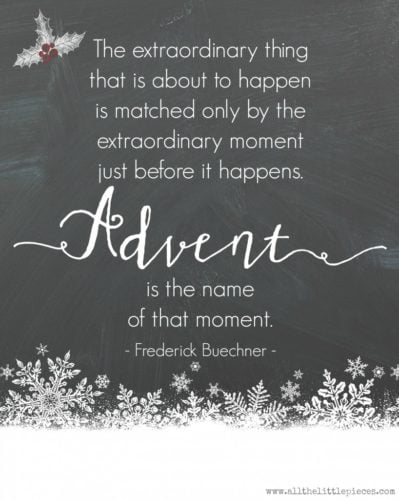 It's the week of hope. Happy first Sunday of Advent, friends!
It's the week of hope. Happy first Sunday of Advent, friends!
Advent is one of my observances all year. And it's not about the pretty decorations or the special candle lightings. . . .
Advent is four weeks that slow us down when everything in our culture wants to speed things up.
It's four weeks that remind us that waiting is our work as people of faith. Nobody gets what they want by snapping their fingers.
It's four weeks that tell us the good news of faithful ones who have lived through dark times in their journey so we can too!
I love what theologian Walter Brueggemann says about Advent: “Advent is an abrupt disruption in our ‘ordinary time’ . . . an utterly new year, new time, new life.”
And don't we all need newness these days?
Though not common like many do with Lent, I love the idea of taking on a practice just for Advent.
Maybe its intentionally having more moments of quiet and meditation in your day? This year I'm using Chalice Press's Partners in Prayer as for my readings. (You can order your own copy too over here).
Maybe its intentionally taking on an act of service in your community as there are so many extra opportunities to care for others during the holiday season. From buying Angel Tree toys to taking cookies to shut-ins, to going caroling with your church at a nursing home there's really so much that can be done!
Maybe it's adding an activity to your week that remind you to not give up hope. A couple of years ago my practice was watching episodes of the PBS series, Call the Midwife (which I highly recommend by the way) You might think this is strange. Watching a tv show? But for me it was really important. For I really found the topic of childbirth painful, especially at Christmas. Yet, by watching these stories of new life unfold it was my way of giving my hopes back to God. It helped me to see the world from a perspective I'd long ignored.
Have an Advent practice that you (or your family) participate in every year? I'd love to hear about it. Share it in an email or comment.
Whatever it is that you decide is your way to make Advent more meaningful this year, do it with full expectation.
Allow God to meet you wherever you are.
Open your heart to the coming of something unexpected.
And most of all, say yes to those urges that could only come from the Spirit.
It's what the season is all about. Really.
Better things are coming. Just wait for it.

Excerpts of a sermon preached a Springfield Christian Church, Springfield, VA on Micah 5:2-5, Luke 1: 46-55
There’s a reason that songs like “New York, New York” and “Hollywood” are so popular. We love singing about the cities where “If you can make it there, you can make it anywhere” because there’s a popular assumption in America that if anything really good happens, it will come out of a big city.
Because of these facts, it’s so easy to believe that important things happen in important towns. Period. If you don’t live in an important town, oh well. . . not much is going to go on.
But is this always the case?
When I say, Seneca Falls, NY, you know it. Why? The women’s movement.
Seneca Falls, a once sleepy town of a few families rose to prominence when Elizabeth Candy Stanton decided to organize a gathering that became THE start of a woman's right to vote.
When I say Selma, you know it. Why? The Civil Rights Movement.
We know of Selma, a sleepy town of a few thousand residents in the middle of Alabama, because of that fateful day on March 7, 1965 Martin Luther King, Jr. and thousands of supporters dared to say segregation would no longer be tolerated.
When I say Plains, GA, you know it. Why? Because of Jimmy Carter.
Plains, a central GA town of still only 688 residents today was the birthplace and still is the homestead of Jimmy Carter, the 39th President of the United States. Who would have thought that a peanut farmer would one day be at the center of American history both in and out of office?
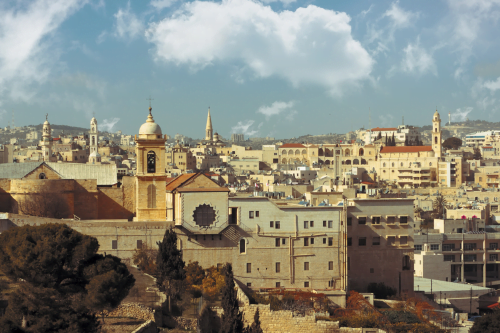 And such seems to be the message of Micah chapter 5. The prophet Micah opens the chapter he says this hopeful word about the nation of Judah’s restoration: “But you, O Bethlehem . . . who are the one of the little clans of Judah, from you shall come forth from me one who is to rule Israel.”
And such seems to be the message of Micah chapter 5. The prophet Micah opens the chapter he says this hopeful word about the nation of Judah’s restoration: “But you, O Bethlehem . . . who are the one of the little clans of Judah, from you shall come forth from me one who is to rule Israel.”
Micah is writing around 760 BC a time the nation of Judah is living under siege from the the Assyrians. They’d invaded the region and their military prowess was bar none—so weren’t going away anytime soon. You can imagine that folks feared for their safety and their security in the future.
And this was the word of the LORD: a new ruler is going to come out of Bethlehem.
I can image the disbelief of those who heard this prophetic message. “You’ve got to be kidding me! Why not Jerusalem or at least some other town . . . Not tiny Bethlehem! Times are hard. We’ve got to do better than that!”
Even though Bethlehem was the the hometown of David, and historically they’d already been through this before--- when Samuel was told by the LORD to go there to anoint the next king of Israel from among the sons of Jesse—the fact in Micah’s time was UNBELIEVABLE as well.
So hope from “one of the little clans of Judah?” Not exactly a New York or LA kind of dream . . .
In Luke's gospel two cousins, Mary and Elizabeth meet up. Filled with wonder of their unexpected and unlikely pregnancies,  they both knew one thing: God was with them. And in Mary’s case quite literally.
they both knew one thing: God was with them. And in Mary’s case quite literally.
For as soon as Elizabeth saw her with child cousin, we are told the Christ child leap in her womb. And in response, not only did Elizabeth exclaim about Mary, “Blessed is the fruit of your womb” but Mary is so overcome with thanksgiving she begins to sing. Saying, “My soul magnifies the Lord.”
And the song, known in our Christian tradition as the Magnificat, is the original radical Advent carol.
Hear these words of Mary: “My spirit rejoices in God my Savior, for he has looked with favor on the lowliness of his servant. . . . [God] has shown strength with [God’s] arm; he has scattered the proud in the thoughts of their hearts. He has brought down the powerful from their thrones and lifted up the lowly.”
I’m not sure Mary would be impressed with our modern-day celebrity figures, presidential candidates or even Barbara Walter’s list of “The 10 Most Fascinating People of 2015” Nope. She speaks of how God has “filled the hungry with good things.”
Famed Episcopal preacher, Barbara Brown Taylor says this about Mary in her book, Home by Another Way: Mary sings, “for every son and daughter who thought God has forgotten the promise to be with them forever, to love them forever, to give them fresh and endless life.”
Mary’s song is the theme of the hopeless!
And it’s like the songs lifted up throughout the pages of scripture by other “lowly ones” come before her.
Such as ones by Miriam, Moses’ sister who sings of the “horse and the rider being thrown into the sea” as the LORD delivers the children of Israel from Egypt.
Ones like from Hannah, barren and without any status from her family or cultural system, sings when she learns she’s pregnant of how “the bows of the mighty are broken but the feeble grid on strength.”
Ones from the unknown Psalmist of number 146 which speak this: “The LORD watches over the strangers, upholds the orphan and the widow.” (7-9).
These songs are resistant songs, much like Mary’s carol. Songs which beat with the sound of God’s heart for those who we’d never expect to get to know! The world may forget, but God does not!
Are you seeing the picture?
 This weekend, my husband and I were a part of a mission in Honduras. As we celebrated Christmas with a group of boys at orphanage each boy received a Christmas present. It’s not an unusual tradition for it now happens every year, but for a couple of the two youngest boys new to the center, it was completely new.
This weekend, my husband and I were a part of a mission in Honduras. As we celebrated Christmas with a group of boys at orphanage each boy received a Christmas present. It’s not an unusual tradition for it now happens every year, but for a couple of the two youngest boys new to the center, it was completely new.
One of them, I'll call him Luis, recently came to the center because his other brothers all died in gang shoot out. His mother was afraid for his life and took him to the country’s social services to ask for him to be placed in a home where he wouldn’t be killed by the men in the gangs too. She could not bear to lose one more son. His adjustment to life without his mom and his brothers hasn’t been easy but slowly Luis is finding his place in his new safe home.
During the Christmas celebration Luis’s name was called to come forward and receive his present. And in his package he found a remote control toy car. After returning to his seat, we later learned that Luis bowed his head, closed his eyes and prayed:
The look of joy, his teacher said, on his face beamed with pride! A dream come true for this 9 year old happened!
This to me, was a picture of what lifting up the lowly is all about. A child in a Honduran orphanage who thanked God for his first Christmas present!
For when I see God come in my life, I most assuredly see God in the faces of kids like Luis.
This is what I most want to offer you today when God comes—God not only keeps God’s promises and sends messengers and gathers us together but God lifts up the lowly.
The only question is will we see our Lord this Christmas? Will we make room for this great surprise?
Mary is 36 weeks pregnant, and baby Jesus is due any day.
How do we learn to wait for a baby savior?
Waiting for Christmas is about waiting for a baby to be born, and as any mom will tell you, that kind of waiting is hard work. We get impatient. We get distracted. We take baby waiting as primarily an excuse to eat huge quantities of butter, chocolate, and combinations of the two. But babies change everything, and learning to wait with hopeful longing for God’s new life to burst into the world is at the heart of the Christian faith.
But not everyone who waits for babies waits 40-week gestational periods. There are some parents who must endure rounds and rounds of infertility tests and treatments to even have the possibility hearing that a baby is officially on the way. There are some parents who wait by wading through the rigors of adoption paperwork and court dates. There are some parents who wait for babies who doctors have said have little chance of survival out of utero. There are some co-waiters: aunts and uncles, grandparents, and siblings who come alongside those who wait for babies, both when there is a due date and also when there is not.
What can all of these experiences of waiting teach us about waiting for baby Jesus?
We (Sarah and Elizabeth) became friends as roommates at Duke Divinity School. We later were both ordained as ministers within the Baptist church. Several years after seminary, I (Sarah) birthed two girls back-to-back and wrote a theological reflection about the experience in a book called, Creating with God. I (Elizabeth) am still waiting to become an official mother, and have written a book (forthcoming) about infertility. How could we as pastors and friends hold our radically different experiences of waiting in the same conversation? This writing project two years ago was our answer.
And again, this Advent season, we invite you to learn to wait for a baby Savior by waiting with us.
If you would like a PDF of the project emailed to you, leave your email in the comments or sent a message in the “Contact” section of the blog and we’ll be glad to send you the daily devotions.
With anticipation,
Sarah and Elizabeth
Here are some of our favorite posts from the project to get you started reading:
“Discovering Joy” Dayna Olson-Getty (a grieving mom’s story about finding peace)
“Discovering Joy” Elizabeth Hagan (a grieving mom to be)
“Discovering Joy” Susan Smartt Cook (a midwife’s perspective on waiting)
“Love That Groans” Beth Dotson (a grandmother who has waited with others)
“Love That Groans” Joy Bennett (a grieving mother who lost a child)
“Waiting with Hope” Jonathan Wilson-Hartgrove (an adoptive dad)
“Waiting with Hope” Sarah Jobe (a mom of 2 young girls)
When we think what will make our Christmas really amazing this year, I’m sure all of us have some ideas . . .
Or, in my case no flight delays on Christmas morning . . .
It’s true: we come to this time of year with lots of expectations.
We want Christmas Eve to be magical full of light and love.
We want Christmas morning to be charged with feelings of peace on earth and no more cyber terrorism.
And if we are a parent, we want the days between Christmas and New Years’ to go by really fast so school starts soon . . .
But have we ever thought about Christmas as the day when nothing went as planned and God’s greatest blessings were completely unexpected?
This is the familiar story that we know: Mary has just gotten the word from the angel Gabriel that she is to bear a son, from the Holy Spirit whose name will be called Jesus.
Beautiful words to start a story, right? But, let’s think about it all from Mary’s perspective. What happened to Mary was nothing she ever planned.
It wasn’t as if Mary came from a life situation where having a child so young, some scholars believe she was as young as 14, was a welcomed joy.
It wasn’t as if Mary was born into royalty where she received a health care plan at Herod’s expense.
It wasn’t as if she had access to the best midwife care in her town.
It wasn’t as if Mary’s very life wasn’t at risk for bearing a child, no matter if this child was the son of God or not.
And, from the information scripture does not give us, we can assume this too: Mary did not come from a supportive family situation.
Never do we hear of her mother, or her father. Or, anyone for that matter that is coming to her aid.
One preacher friend of mine puts it like this: “What Mary does not have is sonogram, or a husband, or an affidavit from the Holy Spirit that says, ‘the child is really mine, now leave this poor girl alone.’ No teen pregnancy organization surrounding her with support.”
So, where was God in such a bewildering time like this? How on earth was she going to get through this especially as her body was changing more and more every day?
 Enter into the picture, Mary’s older cousin, Elizabeth.
Enter into the picture, Mary’s older cousin, Elizabeth.
Another unexpected thing happens in this family---
Elizabeth, at an unknown age way past childbearing years, has found herself pregnant too. Though thinking for years that she was barren and thus, looked upon in society as second class beyond her already lower status state, a child comes to her womb too.
Her son will be named John and will be given the responsibility to prepare the way for the Christ.
So when Mary had the idea of setting out to see her cousin Elizabeth, it was an important meeting for them both. These two—together—might just have some insight into what this crazy God they worshiped was all about.
Then as soon as Mary greeted Elizabeth, Elizabeth’s child is recorded as “leaping in her womb.” It was a prophetic sign that even in spite of the confusion swirling around both of their lives something greater than both of them was occurring. God was very close.
And for the next three months, these two unlikely prophets and prophetic children they are carrying, come to see how their state of being can be considered a blessing.
Rev. Barbara Brown Taylor writes about what occurs with Mary’s state of mind as a result of being with Elizabeth: with her “the young girl doesn’t have to explain her situation to Elizabeth or ask her questions in search of answers, even to ask for acceptance.
When Mary sees her older cousin, Taylor imagines, she sees a ‘gorgeous’ woman, not gorgeous by ordinary standards, you understand, but so full of life that is hard to see beyond her joy.”
The unexpected thing that happens from the moment Mary walked into Elizabeth and Zachariah’s house is that Elizabeth became for Mary the mother figure or spiritual mentor that she needed to re-frame the story of all that was happening to her.
And so as the baby Jesus leaps in Mary’s womb, it is Elizabeth who speaks blessing over Mary’s life in a way that she could only have really heard from her: “Blessed are you among women, and blessed is the fruit of your womb.”
Elizabeth re-narrates this thing that has happened to her cousin in a way she could understand it to be the goodness of God coming to her. Elizabeth gives Mary language to understand this blessing so she can praise God for it!
And through Elizabeth’s loving care, Mary would begin to see that what was happening to her not as “that day that ruined my life” or “some unfortunate circumstances” but a blessing!
I love Elizabeth for this reason—and believe we all need more Elizabeth's in our life (no pun intended!)
But it’s important to say here that as Mary gained this new supportive friend, noting about the hardship of her situations really change (or Elizabeth’s for that matter).
A lot of hard stuff was next! Mary needed to tell Joseph some unwanted news. Soon she would have to endure the stares at the marketplace (everybody wondering, who is Mary’s baby daddy?). And Mary would still have to meet the sharp pains of childbirth in ancient Palestine without much help.
But she would not be alone. Elizabeth would be with her in spirit. God’s son would be growing in her belly.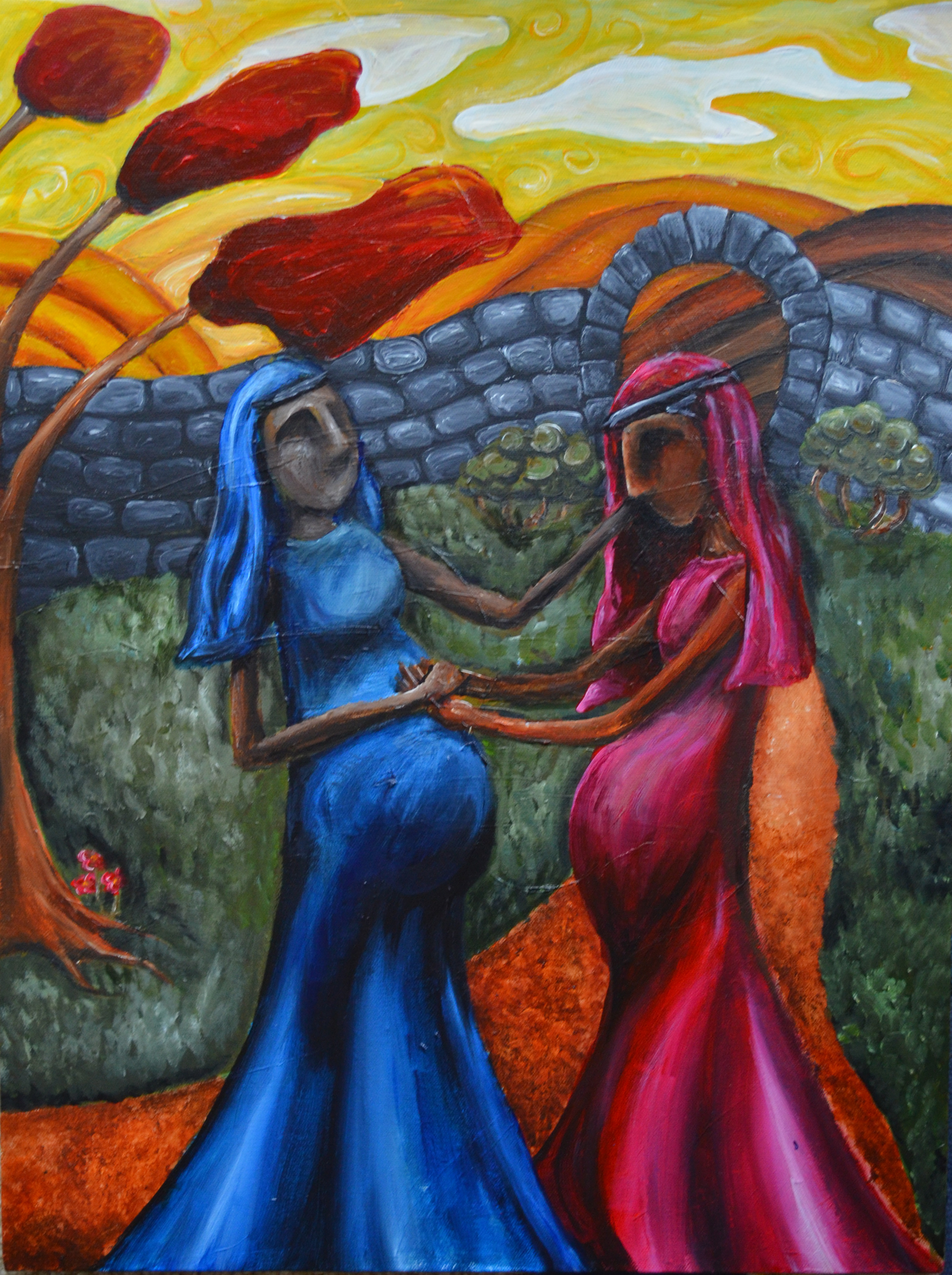
And even thought Mary may not have understood why God choose her, there was a lot to sing about.
That afternoon at Elizabeth’s house, Mary was the unlikely soloist in God’s choir (who knows if she could even carry a tune) but she sings: “My soul magnifies the Lord, and my spirit rejoices in God my Savior . . .. Surely, from now on all generations will call me blessed; for the Mighty One has done great things for me, and holy is his name.”
But, Mary could have been angry.
She could have been overtaken by fear.
She could have protested to God—this is not how the first Christmas should be! I don’t want this part in the play!
But she doesn’t.
She makes the choice to receive the unexpected. She welcomes God into her very being.
Maybe not in the way that history always tells her story—passive full of blind submission, but I believe with maturity that could have only came from sticking close to dear ones like Elizabeth and to her own spiritual instincts.
And as Mary sings about how God “has looked with favor on the lowliness of his servant” she is embodied this new direction of God’s song for all people!
For in God choosing her a peasant girl, God is saying loud a clear, the economic and social tables of this world will soon be turned upside down. A new world order is coming in the kingdom of God that Mary’s child will preach and proclaim. Everything will change!
The most unexpected blessing of all would be that the fruit of her womb, Jesus, would soon bless ALL people of the earth. You and I would not be sitting here today if Mary had not received God’s unexpected gift.
And isn’t it true? God’s unexpected gifts are always better than we could imagine!
So I ask you again, what are you expecting this Christmas?
Anon, a leader of the Islamic faith recorded this prayer about the coming of blessings:
I asked for wisdom...
And God gave me problems to solve.
I asked for prosperity...
And God gave me brains and the strength to work.
I asked for courage...
And God gave me danger to overcome.
I asked for love...
And God gave me troubled people to help.
I asked for favors...
And God gave me opportunities.
I received nothing I wanted.
I received everything I needed.
My Prayer has been answered.
I shared this prayer because I have seen it come true time and time again in my life.
How often have I set out on a life path thinking, I know exactly how the story is all going to end, only to land somewhere different? But ultimately is better if I’m walking in the ways of the Spirit?
Just think for a moment where in life you were on this day—December 21st or hereabouts last year?
What were you consumed with? What were you worried about? What were you spending most of your time on?
I think about my own life—last Christmas, sort of sad. I was thinking about how much I had to say but no place to say it. But now, I am having so much at The Federated Church.
If we take just a moment to gain some big picture perspective, what we’ll find is that God is doing unexpected things in our lives all the time. He’s making crooked paths straight. He’s leading us into new relationships. He’s opening doors where life’s cruelties have shut windows.
But the question for us is—how are we responding?
Are we blocking the movement of the Holy in our lives by being consumed in things that really don’t matter much in the end?
Are we blocking the moment of the Holy by refuses to see what are the best choices for our life’s routines?
Are we blocking the movement of the Holy by our own stubbornness to believe this unexpected story of redemption?
 Today, my friends let us take some encouragement from Mary. Let us follow in her footsteps and make the choice to believe. Knowing that as we do, an Elizabeth is on her way—whoever she may be—to inspire us for all that lies ahead.
Today, my friends let us take some encouragement from Mary. Let us follow in her footsteps and make the choice to believe. Knowing that as we do, an Elizabeth is on her way—whoever she may be—to inspire us for all that lies ahead.
Let us not let one more moment pass in this busy time of year where we don’t make room in our hearts for more peace, more hope, more joy and more love.
Why?
Because tis the season for Christ to be born and we need to get ready!
“Oh come my heart, Lord, Jesus, there is room my heart for you.”
AMEN
A sermon preached at The Federated Church, Weatherford, OK . . . Mark 1:1-8
Our lives get really busy this time of year, don’t they?
Parties to attend. Presents to buy. Family celebrations to prepare for . . .
Even look at the back of the bulletin this morning and you’ll see a list long of upcoming activities, more than usual around here.
But over the next couple of Sundays in Advent that you’ll hear my voice from the pulpit, we’re going to be talking about what it means to find space in our lives We’re going to talk about what it means to spend our time in ways that bring us closer to that One we are waiting for. And we’re going to practice making room for more of the Christ child to be born in us.
I hope that worship can SLOW us all down a little.
Not just in clique ways that could be summed up by the popular statements like: “Jesus is the reason for the season” or “Don’t take Christ out of Christmas” but truly opening our lives for more of the Son of God, God with Us to come in.
As we look at our lections for today, Mark’s gospel opens by declaring the fulfillment of a prophecy text from Isaiah 40:
“It is written in Isaiah the prophet, ‘I will send my messenger ahead of you, who will prepare your way, a voice calling out in the desert, prepare the way of the Lord.”
 And this messenger’s name is John. Or more properly known as John the Baptist.
And this messenger’s name is John. Or more properly known as John the Baptist.
John was the messenger of preparation—the greatest opening act that there ever was, telling the people who gathered around him in the desert that something really good was coming and they needed to make room in their lives to receive it.
John was an unlikely opening act. We learn a few things about him in Mark 1, verse 6. He lived in the desert. He wore clothing made out of camel’s hair. He wore a leather belt around this waist. His diet consisted of wild locust and honey. What a description!
John the Baptist was man who was of the land, who lived off the land, and who had a simple message: a baptism of repentance for the forgiveness of sins.
And though we hear a version of John’s story read every Advent, it’s one, I think, that all of us have a hard time relating too, given our place in history and geography. For we don’t live in remote desert and John simply sounds like a deranged character we’re not sure that we’d ever want to meet.
But might there be something the setting of this one preparing the way, that might tell us something about what making room for Jesus is all about?
I think it is no coincidence that John asks the people to repent and be baptized in the desert.
The desert is a lonely place.
The desert is a quiet place.
The desert is a place with few distractions.
The desert gives our hearts space that they don't otherwise have . . .
And throughout the centuries, it has been the place where spiritual seekers have gone to find God.
And it just so happened that this week I spent time in the desert of Northern Kenya, in the county of Turkana that isn’t too far from Sudan. I wasn’t on a spiritual pilgrimage but Kevin and I along with several members of our staff in Kenya traveled to visit programs through Feed the Children.
It began like this: we took a small charter plane to an airstrip in the middle of the true definition of “no where” to then take a van on an hour drive to the 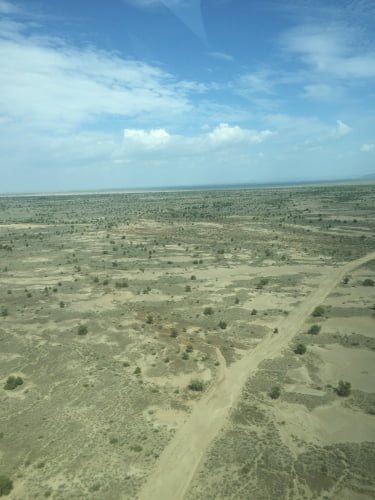 community of the Turkana people.
community of the Turkana people.
As we traveled the dusty roads with barren trees and goats and wild camels roaming around, the feeling of starkness was overwhelming. Wide-open spaces with few people and homes made out of tree limbs and covered with animal skins filled our vision.
There were no stores. There were no street signs. There were few cars, if only just ours for miles and miles.
The thick heat of the desert warmed our van, even with the air conditioning blasting. I told Kevin we’d better put thick layers of sunscreen on if we didn’t want to be complete toast by the end of the day.
It was like being in the pages of National Geographic as our van pulled up to the school where Feed the Children donors recently built a multifaceted water aquifer powered by solar panels (so that the Turkana people didn’t have to walk over 10 miles one way to the nearest water source).
Women dressed in brightly colored wraps with multicolored necklaces around their elongated necks greeted us with dancing and song. The male elders of the community soon took Kevin by the hand and made him an honorary chief completely with a staff, stool to sit on and a hat made of ostrich feathers. Children followed us around in torn clothing and flip-flops made of old tires on their feet.
And though we could have easily judged this way of life as backward or disorganized or even said to ourselves, “How could these parents allow their children to grow up like this?” upon deeper observation we saw there was a bigger picture of what life is like in the desert.
Life, you see, in the desert looks clear in ways that it doesn’t in the hustle and bustle of city and town life. We can’t hide behind gadgets. We can’t pretend that we can go it alone. We can’t waste anything that could be used for the common good.
In the case of Turkana, we learned that the desert gave those we met rhythms that governed their life together including respect for the land and thanksgiving for life’s most important blessings: food, water and education for their children. And most of all, in the remote location, they knew they needed each other. They belonged together and organized themselves accordingly. There was great clarity in who they were and what they were about.
And, being in the actual desert this week convicted me of many things—
And for all of us, we have a lot to learn from the desert and those who dwell there.
But what if you never live or visit a place like this? It doesn't matter. Deserts can be anywhere. We can all slip away from time to time into spaces—even if they are just mental places where our phones are turned off and our minds are at rest.
This is what I know: you and I are never going to be ready to meet the Christ child this Christmas if we aren’t willing to alter the practices of our lives, to go to places of solitude where we can hear the God, where we can remember what really matters in life and can turn away from what keeps us from having room for Jesus.
Catherine de Hueck Doherty, a Christian teacher and activist wrote while serving amongst the poor in Canada in the 1960s this about making room for God saying that solitude is not about the fantasy of a cute little cabin in the woods or spending a week chanting with monks.
No, I think Catherine would propose that we could find “deserts” right here in Weatherford, OK (or wherever we live).
Catherine writes: “One of the first steps toward solitude is a departure. Were you to depart to a real desert, you might take a plane a train or car to get there. But we’re blind to the “little departures that fill our days. These “little solitudes” are often right behind a door which we can open, or in a little corner where we can stop."
Catherine goes on say what these desert moments can be saying: “Consider the solitude that greets you when you enter your room to change your working clothes to more comfortable ones . . . Consider the solitude of housewife, alone in her kitchen, sitting down for a cup of coffee before beginning the work of the day.”
I would add the solitude of the moment you first open your eyes in the morning.
Or the solitude of brushing your teeth after showering.
Or the solitude of driving to work in the morning, without the radio on.
These are all places where we don’t have to do anything different from we otherwise would, but moments when we can be aware then, stop and know who is God.
Because I believe, just as John the Baptist taught us that real life re-alignment does not take place in the fast paced, over crowd space that you and I live in. Especially in a season like Christmas where everybody wants us to be somewhere doing something that seems really important at the time.
No, God leads us to spiritual deserts.
So, I want to tell you this, if we want to make room for Jesus this Christmas, you and I are going to have to stop, we’re going to not let the moments of “desert” that find us pass us by.
And if you’ve been trying to live the Christian life for any time, I bet you know what I mean when I say pay attention to the still small voice that speaks to us saying, “This is my path walk in it” or “Come away with me, my Beloved."
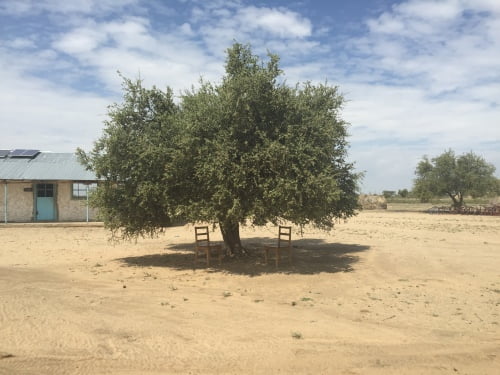 For this is what making room for Jesus is all about. For when we make room in our days to be present—I believe, and then the Holy One also becomes present to us. Not because the Holy has ever gone anywhere or left us, but these are the times we have the capacity to listen!
For this is what making room for Jesus is all about. For when we make room in our days to be present—I believe, and then the Holy One also becomes present to us. Not because the Holy has ever gone anywhere or left us, but these are the times we have the capacity to listen!
And let me say this--- we live in a culture where practices of mediation, yoga and silent retreats are all the rage. And they are great practices with great health and mental benefits. But we can’t stop here.
Going to the desert, finding solitude means nothing unless we aren’t led as John the Baptist was--- to the One whose sandals he was unworthy to untie.
For it’s the ultimate calling of Advent—to make room for Christ.
He's the light that can make the most unhappy of us this Advent open our heart to believe again.
He's the light that can break through the coldest of hearts, the most horrid of circumstances to hope again.
He's the light that can touch our souls in expressions beyond words to know that peace that passes all understanding.
So this morning, Calling all dreamers . . . calling all wanderers . . . calling all grieving friends who think you can't possibly live through another Christmas . . . calling all those who want a life different from you see right in front of you right now. The good news has come. And it is in the desert.
Come, and receive what you are most longing for this Advent: a deep abiding peace. Darkness will be over soon. And, peace will reign in our hearts.
AMEN